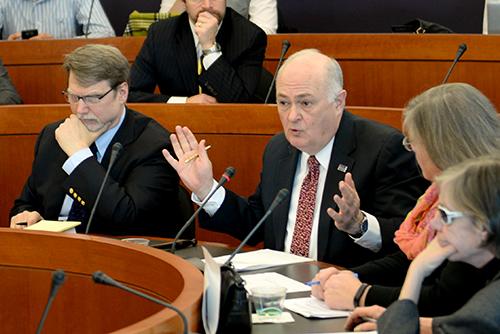
A faculty and staff task force will take a deeper dive into GW’s benefits packages, University President Steven Knapp announced at a Faculty Senate meeting Friday.
The group will be charged with creating a set of recommendations about all GW benefits packages, which will help the faculty budget advisory committee decide how much money is allocated to certain areas, Knapp said. Rising health care costs across the country have forced employees to either pay more out-of-pocket or cut back on funds allocated to other types of benefits.
Knapp made the announcement after nearly 30 minutes of discussion about how the University rolled back tuition benefits this year, which allowed the amount of money employees pay out-of-pocket for health insurance to increase at a slower rate than in previous years.
“Clearly there was something that was done about it this year that had some unpopular features to it, and so the question is lets have a broader discussion,” Knapp said in an interview Friday.
Knapp said he will speak with the Faculty Senate executive committee to determine how members of the task force will be chosen.
The Board of Trustees allocates money to benefits annually, and has increased the amount about 3 percent every year for the last several years. The University, with advice from the fiscal planning and budgeting committee, allocates the money to different types of benefits packages.
After the Faculty Senate asked that GW’s contributions to health insurance increase, officials announced rollbacks to the tuition benefits program to save about $750,000, which was set aside for health care.
But staff members pushed back last month, creating a petition asking that current employees keep their benefits as they are now. Hundreds of faculty, staff and students signed the petition, making it one of the most widely supported appeals in recent University history.
The task force will have to look at the tradeoffs between allocating funds for salaries and for benefits, while answering the more “philosophical questions” about the issue, Knapp said.
“The faculty budget advisory committee I think has been doing a good job of looking at these issues, but it’s a relatively small committee,” he said. “I think given the importance of these issues to the whole University community, it’s time to probably step back, as we’ve done in a number of other areas.”





